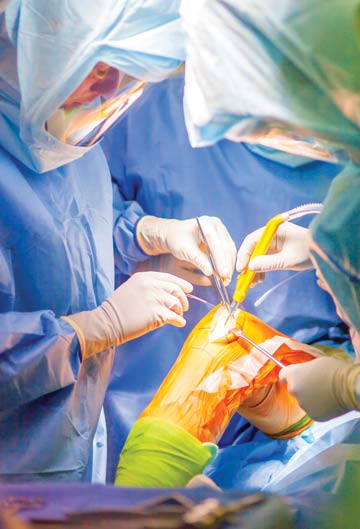 UP AND RUNNING A new AORN survey found orthopedics is among the specialties with the highest case volumes as facilities come back online..
UP AND RUNNING A new AORN survey found orthopedics is among the specialties with the highest case volumes as facilities come back online.. Elective procedures were put on hold in March when the coronavirus began to spread across the country. A study recently published in the British Journal of Surgery provides a clearer idea of the size and scope of the shutdown.
Researchers with CovidSurg Collaborative culled data from 359 responding hospitals in 71 countries to estimate 12-week cancellation rates, which they used to estimate the total number of canceled surgeries in each country. More than 4 million operations were called off in the U.S. and more than 28.4 million were postponed worldwide during the peak 12 weeks of the pandemic, according to the study.
"These delays may significantly impact patients' quality of life, the ability to do their work or care for their loved ones," says Giana Davidson, MD, MPH, FACS, an associate professor of surgery at the University of Washington School of Medicine who partnered with CovidSurg Collaborative. "As we start the process of reopening, it's critical that we also strive for equitable access to surgical care across the communities we serve."
Efforts to reach pre-COVID-19 case volumes have begun in surgical facilities across the country as elective procedures come back online. A new AORN survey of more than 1,000 surgical leaders in academic medical centers, hospitals and surgery centers identifies general surgery, orthopedics and urology as specialties with the highest case volumes during the current ramp-up phase. More than half of the respondents say up to 40% of their patients have canceled elective procedures, although surgery centers have the lowest reported rate of cancellations.
The surgical leaders expressed general concerns about limited supplies of PPE, lengthier turnaround times between cases due to more stringent cleaning protocols, a lack of available COVID-19 testing and the potential for a resurgence of the virus in the fall.
Indeed, authors of the BJS study warn subsequent waves of COVID-19 would lead to additional mass cancellations of cases. "Strategies to safely maintain surgical volume during and immediately following outbreaks should be explored," they write.
Joe Paone.svg?sfvrsn=be606e78_3)
.svg?sfvrsn=56b2f850_5)